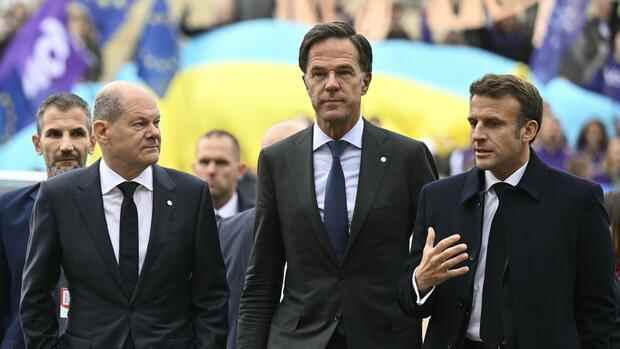The Chancellor arrived with the French President and the Dutch Prime Minister, but the gas issue is a crunch.
(Photo: ddp/CTK)
Prague Olaf Scholz has rejected criticism from EU partners of Germany’s €200 billion relief package. At the informal EU summit in Prague, the chancellor emphasized on Friday that the package was not unique to Germany. “Such programs are also planned elsewhere and have already been implemented,” said the SPD politician. Compared to the economic performance, the German program is “in the middle”.
Scholz said he was able to clear up “misunderstandings”. “I don’t think anyone has anything against us doing it.” The public statements made by colleagues are often “more pointed” than what he hears in direct conversations.
Several EU heads of government had complained that the gas price brake gave German companies an unfair advantage and distorted competition. Poland’s Prime Minister Mateusz Morawiecki accused Berlin of “selfishness” and the “destruction of the internal market”. EU Internal Market Commissioner Thierry Breton announced a competition law review of the German package.
At the beginning of the week, the euro finance ministers had already warned of the fragmentation of the euro zone if financially strong and weak countries did not coordinate their measures better.
Top jobs of the day
Find the best jobs now and
be notified by email.
Austria’s Chancellor Karl Nehammer blamed the EU Commission. The German package is a “wake-up call” for the Brussels authorities to finally propose a concrete European solution. “If the Commission doesn’t get going, nation states will start to help themselves,” said the Conservative politician. “And that’s what we’re seeing right now.”
Four options to reduce gas prices
The question of what Europeans can do about high gas prices dominated the meeting in Prague. Various price caps and a joint purchase have been discussed for weeks. An agreement should be found by the next formal EU summit in Brussels on October 20.
The following options are under discussion:
- Gas price cap on imports: 15 EU countries are demanding a general price cap on all gas imports to Europe. Four of these countries, Poland, Belgium, Greece and Italy, advertised in Prague for a “dynamic” cap, which should always be five percent above the market price in the major markets outside Europe. In this way they want to ensure that Europe remains an attractive customer and receives enough gas. Disadvantage: Such a lid is technically difficult to implement and there could be delivery problems.
- Negotiations with suppliers: EU Commission President Ursula von der Leyen and Norwegian Prime Minister Jonas Store declared that they wanted to take joint action against market manipulation. Norway is the EU’s most important gas supplier and benefits from the high prices. Concrete price reductions have not yet been agreed. Several heads of government promoted long-term supply contracts to ensure supplies. Disadvantage: The currently high prices would be fixed for a long time – even if the acute bottleneck were to be overcome. Success would also not be certain, because negotiations have been going on for months without a result.
- Joint gas purchase: There is a broad consensus that joint purchasing would make sense. One could negotiate better conditions for everyone with the market power of the EU, argued some summit participants. Disadvantage: The jointly purchased gas must be distributed fairly within the EU – this would guarantee new disputes.
- National relief packages with EU aid: If the 27 member states cannot agree on a European gas price cap, the states would probably have to continue to pay subsidies in order to depress energy prices for households and companies. So that financially weak states do not fall behind in the subsidy race, calls for EU support are now being made. This week, EU Commissioners Breton and Paolo Gentiloni called for a new EU fund to be set up from which member states can obtain cheap loans. Alternatively, it would be conceivable that further funds from the €750 billion Corona reconstruction fund could be reallocated to combating the current energy crisis. Most of the money has not yet been called. Disadvantage: The EU countries would continue to fill the coffers of the gas suppliers and take on new debts in return.
No consensus emerged in Prague. According to Belgian Prime Minister Alexander de Croo, more than 20 countries are now in favor of a gas price cap. But several countries, including Germany and the Netherlands, have warned against such market intervention because they fear supply problems. The latest decision by OPEC plus is seen as a warning. The producing countries reduced oil production after the EU decided to cap prices on Russian oil.
Scholz said it was important to get gas prices down. The proposals are diverse, now they have to be checked “for practical usefulness”. “It must always be ensured that gas, oil and coal are always delivered to Europe.”
>> Read here: Berlin, Madrid and Paris are fighting over the Pyrenees pipeline – Europe’s solidarity in the energy crisis has limits
When examining the proposals, there should be “no bans on thinking”. He was open to reallocating billions more from the Corona reconstruction fund. There is “leeway” because most of the money has not yet been spent.
The Commission and the energy ministers must now draw up a concrete proposal. “We have to make a decision as soon as possible,” said EU Council President Charles Michel. “Wasting time is not an option.”
More: Germany only wants a gas price brake for its own citizens and is thus antagonizing the EU.
